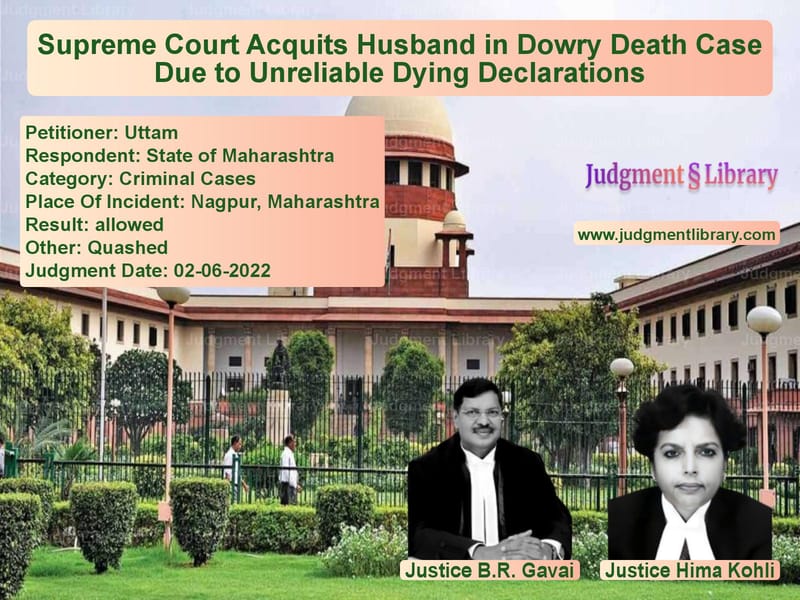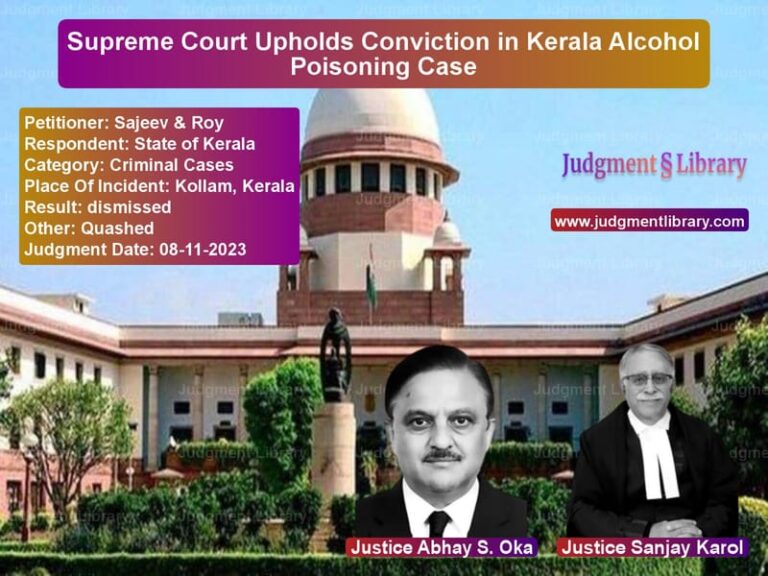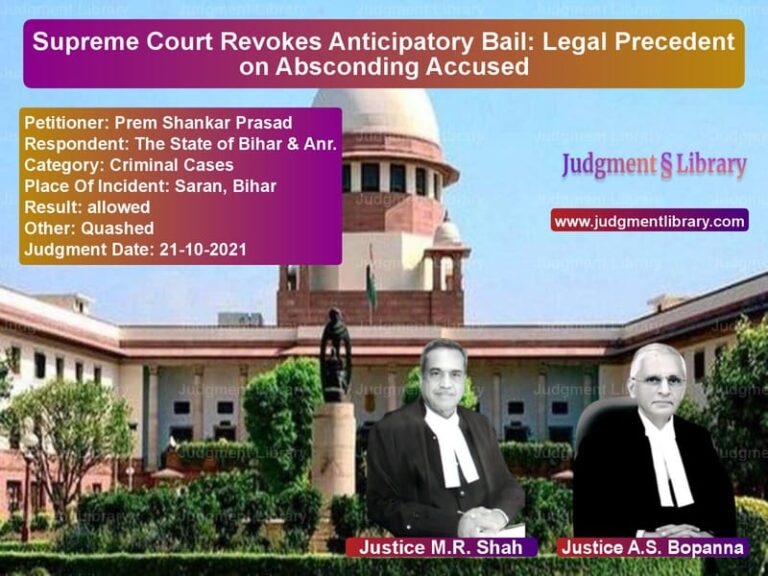Supreme Court Acquits Husband in Dowry Death Case Due to Unreliable Dying Declarations
The Supreme Court of India recently delivered a significant ruling in the case of Uttam v. State of Maharashtra, where the appellant was acquitted of murder charges due to inconsistencies in multiple dying declarations. The case, which stemmed from the tragic death of Pushpabai, the appellant’s wife, involved allegations of dowry demands, domestic violence, and an extramarital affair. The Court found that the prosecution failed to establish guilt beyond reasonable doubt, leading to the appellant’s acquittal.
Background of the Case
The case dates back to March 27, 1995, when Pushpabai suffered severe burn injuries at her residence in Maharashtra. The prosecution alleged that her husband, Uttam, poured kerosene on her and set her on fire following an argument over his illicit relationship with a neighbor. Pushpabai was rushed to Mayo Hospital, Nagpur, where she succumbed to her injuries on March 31, 1995.
Based on the initial investigation, Uttam was convicted under Section 302 of the Indian Penal Code (IPC) and sentenced to life imprisonment by the 8th Additional Sessions Judge, Nagpur. His appeal was later dismissed by the Bombay High Court in 2010, upholding his conviction. Uttam then approached the Supreme Court, challenging the verdict.
Key Issues Before the Supreme Court
- Whether the multiple dying declarations made by Pushpabai were reliable and consistent.
- Whether the prosecution had proved beyond reasonable doubt that Uttam was responsible for his wife’s death.
- Whether the High Court erred in rejecting written dying declarations while relying on oral statements made to family members.
Petitioner’s (Appellant’s) Arguments
Uttam’s defense presented several key points:
- The prosecution relied on four different dying declarations, two written and two oral, which were inconsistent.
- The High Court had discarded the written dying declarations due to procedural lapses but still upheld the conviction based on oral statements made to relatives.
- The victim’s father and a mediator, who testified about the oral declarations, had never mentioned them to the police before the trial, making their testimony unreliable.
- Medical evidence suggested that Pushpabai had suffered 93% burns, raising doubts about her ability to make consistent and coherent statements.
- The investigation was flawed, and the police failed to properly examine alternative causes of the fire.
Respondent’s (State of Maharashtra) Arguments
The State of Maharashtra, in its defense, argued:
- The dying declarations, despite inconsistencies, consistently named Uttam as the perpetrator.
- The medical reports confirmed that Pushpabai was conscious and fit to give statements when the declarations were recorded.
- Even though the written declarations were discarded, the oral declarations to her father and a family mediator should be considered reliable.
- The Chemical Analysis Report detected kerosene on both the victim’s and accused’s clothing, supporting the prosecution’s case.
- The defense failed to provide an alternative explanation for how Pushpabai caught fire.
Supreme Court’s Observations
The Supreme Court conducted a detailed analysis of the case, focusing on the reliability of the dying declarations. The Court noted:
“A dying declaration must be free from tutoring, prompting, or imagination. Where multiple dying declarations exist, consistency is key to their evidentiary value.”
The Court found that the two written dying declarations, recorded by the police and a Special Executive Magistrate, suffered from serious procedural lapses:
- The attending doctor was not present during the recording of the second declaration.
- The first declaration lacked proper certification of the victim’s mental fitness.
- The statements were not recorded in a question-and-answer format, raising doubts about their authenticity.
Regarding the oral dying declarations made to family members, the Court ruled:
“Statements made to interested witnesses, especially when introduced for the first time at trial, must be viewed with caution.”
The Court observed that the oral statements presented a different motive (dowry demands) than the written declarations (extramarital affair), further weakening their credibility.
Final Judgment
The Supreme Court ruled:
- The conviction was set aside due to unreliable evidence.
- Uttam was acquitted and ordered to be released immediately.
- The ruling emphasized the need for strict adherence to procedural safeguards in cases relying on dying declarations.
Conclusion
The judgment in Uttam v. State of Maharashtra serves as a crucial precedent in Indian criminal law, particularly regarding the evidentiary value of dying declarations. The ruling highlights the importance of:
- Ensuring consistency and procedural correctness in recording dying declarations.
- Carefully evaluating statements made to interested witnesses.
- Adhering to the principle of “beyond reasonable doubt” in criminal cases.
By acquitting Uttam, the Supreme Court reaffirmed that courts must rigorously scrutinize evidence before upholding convictions, ensuring that procedural fairness is not compromised.
Petitioner Name: Uttam.Respondent Name: State of Maharashtra.Judgment By: Justice B.R. Gavai, Justice Hima Kohli.Place Of Incident: Nagpur, Maharashtra.Judgment Date: 02-06-2022.
Don’t miss out on the full details! Download the complete judgment in PDF format below and gain valuable insights instantly!
Download Judgment: uttam-vs-state-of-maharashtra-supreme-court-of-india-judgment-dated-02-06-2022.pdf
Directly Download Judgment: Directly download this Judgment
See all petitions in Murder Cases
See all petitions in Dowry Cases
See all petitions in Judgment by B R Gavai
See all petitions in Judgment by Hima Kohli
See all petitions in allowed
See all petitions in Quashed
See all petitions in supreme court of India judgments June 2022
See all petitions in 2022 judgments
See all posts in Criminal Cases Category
See all allowed petitions in Criminal Cases Category
See all Dismissed petitions in Criminal Cases Category
See all partially allowed petitions in Criminal Cases Category







